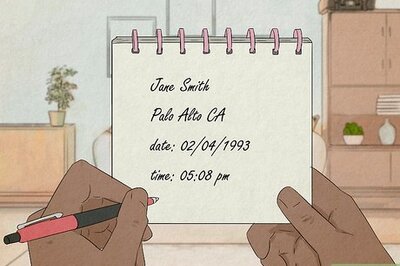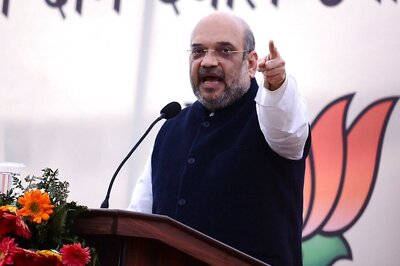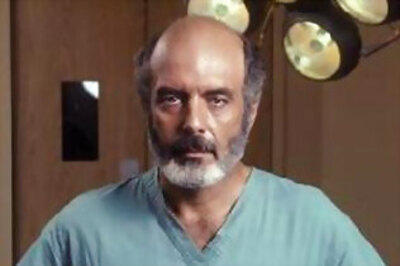
views
Manama: Bahrain is committed to talks with the opposition but security is a priority and more Gulf troops will arrive in the kingdom to help restore order after weeks of unrest, the foreign minister said on Friday.
Sheikh Khaled bin Ahmed al-Khalifa said three or four Gulf states were sending troops and the forces would remain for as long as it took to bring calm after protests by the Shi'ite majority slid into sectarian violence and crippled the economy.
Their role would be limited to guarding strategic assets such as oil facilities, however, and they will not be involved in quelling protests, he told a news conference in Manama.
"We look with all confidence to the return of normal life in Bahrain," Sheikh Khaled said. "We know dialogue is our path."
Sunni-ruled Bahrain has arrested seven opposition leaders and driven pro-democracy demonstrators from the streets after weeks of protests that prompted the king to declare martial law and sucked in troops from fellow Sunni-ruled Saudi Arabia.
Three protesters died in the security sweep. Three policemen were also killed, hit by cars driven by demonstrators.
On Friday, diggers tore down the statue at the centre of Pearl roundabout, focal point of weeks of protests, in what the foreign minister said was an effort to erase "bad memories".
The ferocity of the crackdown, in which troops and police fanned out across Bahrain, imposed a curfew and banned all public gatherings and marches, has stunned Bahrain's Shi'ites.
Shouting "down with King Hamad", thousands buried an activist killed in a crackdown that has angered Iran and raised tension in the world's largest oil-exporting region.
Mourners carrying pictures of activist Ahmed Farhan, killed on Wednesday, followed a car carrying his flag-covered coffin.
A helicopter buzzed overhead and tanks lined the entrance to Sitra, where Farhan was buried, but did not disperse mourners.
"This is a big loss... They can say what they want about us but we are non-violent. We will never use violence," said Yousif Hasan Ali, who was in jail with Farhan, 30, for over two years.
"They may silence this generation but another will rise up to demand revenge for the blood that was shed now."
FRIDAY PROTESTS
Sheikh Issa Qassim, Bahrain's most influential Shi'ite cleric, said in his Friday sermon that Gulf troops would have been better off helping Palestinians in Gaza than entering Bahrain and thanked those who died or resigned in the uprising.
"The violence of the authorities has created a deep, wide and dangerous wound between the government and people," he said.
"The government wants to break our will so we give up our calls for substantial and meaningful reforms, but they will never break our will. They can use tanks and planes to smash our bodies but will never break our souls and our will for reforms."
Sheikh Khaled said, however, that the royals had done their utmost to push for dialogue, allowing protests and offering assurances, but the opposition had rejected talks and started blocking main streets, while civilians began to clash daily.
"In volatile situations you do expect violence to happen but there is no systematic violence against the people," he said.
In an effort to wipe out all trace of the uprising, drills hammered at the base of Bahrain's most recognisable landmark until it collapsed into a mound of rubble on Friday.
The statue comprised six sails symbolising each of the six members of the Gulf Cooperation Council, holding up a pearl, symbol of the pearl fishing heritage that was the economic mainstay of the region before the discovery of oil.
"It is a kind of psychological victory for the protesters," said Hussein Oraibi, who works in telecoms. "It upset them so much that people were gathering there, they had to go out of their way to pull this down and change the traffic directions."
No troops or police could be seen as thousands stood outside Draz mosque after Qassim's sermon, demanding Gulf troops leave.
"Peninsula Shield Out," they called, and "Bahrain is free".
Showing its desire to avoid new violence, the largest Shi'ite party Wefaq told its followers by text message not to provoke police and not to use slogans that offend the royals.
The mourners appeared not to adhere to those requests.
Shaking their fists, mourners shouted "death to al-Khalifa" and "death to Al Saud", referring to the royal families of Bahrain and Saudi Arabia.
"I'm not really afraid, the worst is that I get killed and it would be for Bahrain, right? Better to die trying to get our freedom," said Haitham, 45, a Shi'ite from Sitra.
More than 60 percent of Bahrainis are Shi'ites. Most are campaigning for a constitutional monarchy, but calls by hardliners for the overthrow of the monarchy have alarmed Sunnis, who fear the unrest serves Iran, separated from Saudi Arabia and Bahrain by only a short stretch of Gulf waters.
Shi'ite Muslim power Iran, which supports Shi'ite groups in Iraq and Lebanon, complained to the United Nations and asked other neighbours to join it in urging Saudi Arabia to withdraw.
In a sign of rising tension, Sheikh Khaled condemned what he said was Iran's interference in Bahrain's internal affairs.
Capital flight is starting to put pressure on Bahrain's currency and threaten its position as a Gulf financial centre.
Standard & Poor's Ratings Services slashed its long- and short-term sovereign debt rating to BBB/A-3 from A-/A-2 and maintained negative watch.



















Comments
0 comment